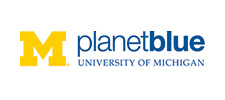
More online
• White House Council on Environmental Quality >
• Great Lakes Restoration Initiative >
• Environmental Protection Agency >
• Healing Our Waters Coalition >
More than 80 environmental, sustainability and academic leaders dealing with Great Lakes issues — including two from U-M — gathered Feb. 29 at the White House Great Lakes Summit to participate in a dialogue regarding the future plans for these massive bodies of fresh water.
Don Scavia, special counsel to the U-M president for sustainability, and Knute Nadelhoffer, professor of ecology and evolutionary biology, participated in the event organized by the White House Council on Environmental Quality.
The summit followed a smaller meeting between non-governmental organization and academic leaders and Obama administration officials in the West Wing of the White House. At the earlier Feb. 27 meeting, Scavia and the Great Lakes advocates put forward an agenda requesting several actions:
• Maintained funding for the Great Lakes Restoration Initiative (GLRI)
• A boost in federal assistance to help communities combat sewage overflows
• Enactment of strong protections against ballast water invaders
• Confrontation of the algae bloom epidemic in Lake Erie
• More aggressive action to separate the Great Lakes and Mississippi River to prevent the spread of Asian carp
• To ensure the restoration initiative contains a solid scientific core
As a member of the Environmental Protection Agency Science Advisory Board panel that reviewed the GLRI and a science adviser to the Healing Our Waters Coalition, Scavia attended the Feb. 27 meeting where the role of science and scientists was emphasized as key to ensuring the hundreds of individual GLRI projects add up to the larger goals of restoring the lakes.
“To support an adaptive management framework for this massive restoration effort, it is critical that we monitor and assess progress at local to regional scales and across the range of stresses,” Scavia said.
“The administration made unprecedented investments in restoring the Great Lakes and made it a priority to work with state, city, environmental, academic and business leaders toward lasting solutions,” said Nancy Sutley, chair of the White House Council on Environmental Quality. “(The Feb. 29) gathering at the White House is another important step in advancing the partnership between federal agencies and community leaders that has fostered success for the Great Lakes Restoration Initiative and its goal of a healthy environment and a thriving economy for all Americans.”
Established in 2010 with financial backing to date of $785 million, the GLRI addresses five urgent issues facing the bodies of freshwater:
• Cleaning up toxics and areas of concern
• Combating invasive species
• Promoting near-shore health by protecting watersheds from polluted runoff
• Restoring wetlands and other habitats
• Tracking progress and working with strategic partners
President Obama requested an additional $300 million for fiscal year 2013 for the initiative, and it was announced at the summit that the White House plans to continue the GLRI as a national priority, extending the current plan timeframe beyond fiscal year 2014.
The Secretary of Commerce noted the importance of the Great Lakes to the regional and national economy, citing the Michigan Sea Grant’s Great Lakes Jobs 2011 Report. According to the report, economic data show more than 1.5 million jobs are directly connected to the Great Lakes, generating $62 billion in wages. The Great Lakes are responsible for jobs in several sectors, including tourism and recreation, agriculture, fishing and food production, science and engineering, and the largest sector, manufacturing.
“U-M is excited with the opportunity for academics to have a more focused and sustained role in helping frame and implement the stronger science program,” Scavia added. “We believe academics are in a great position to tackle this hurdle, to help design a system for answering the key accountability questions, and assessing how these actions add up to meet the larger goals.”

